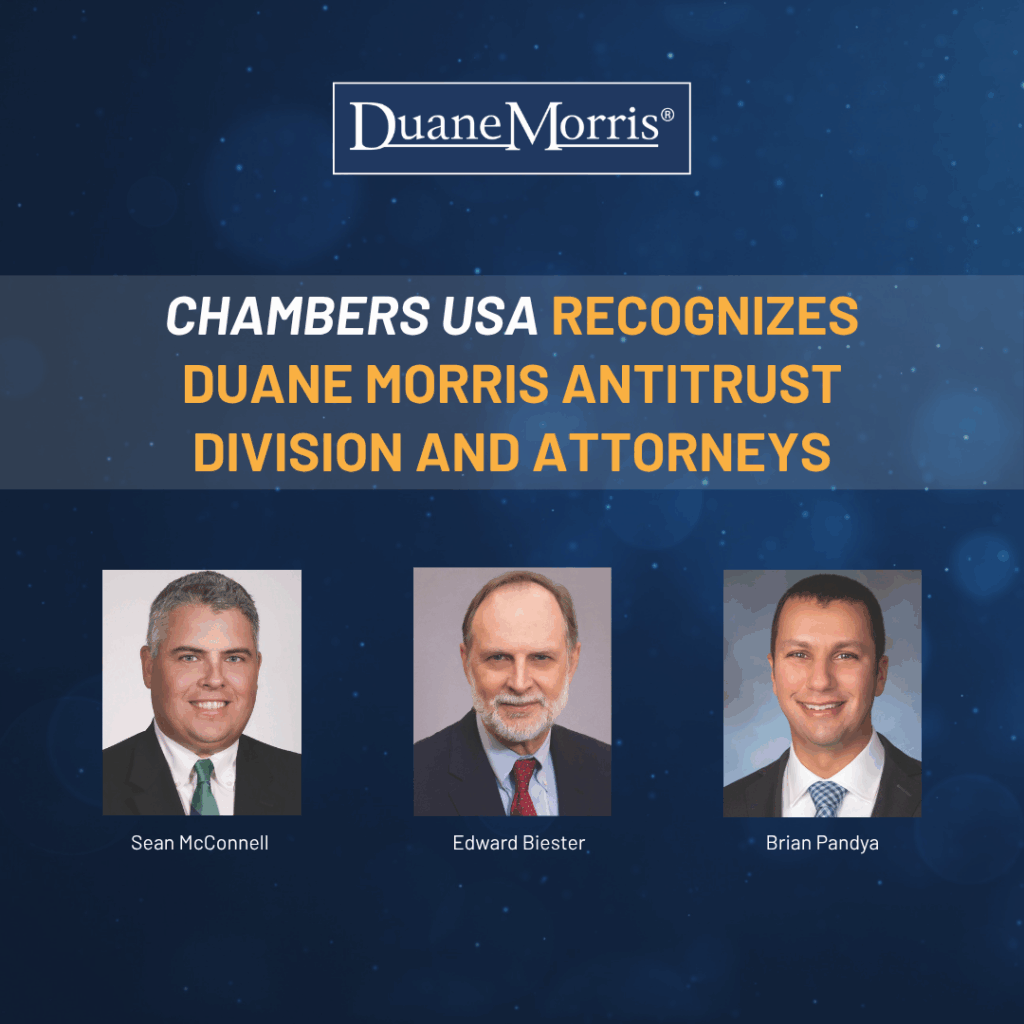On January 14, 2026, the Federal Trade Commission announced increases to the jurisdictional thresholds for premerger notification under the Hart-Scott-Rodino Antitrust Improvements Act. The FTC adjusts the thresholds annually, consistent with changes to gross national product. The announced changes will become effective for filings made or transactions closing 30 days after publication of the revised thresholds in the Federal Register.
NASCAR & Racing Teams Settle Antitrust Dispute
On December 11, 2025, NASCAR settled an ongoing and closely watched antitrust trial brought by two racing teams, 23XI Racing (co-owned by Michael Jordan) and Front Row Motorsports, in the U.S. District Court for the Western District of North Carolina. The settlement was announced after the plaintiffs had presented their case-in-chief and following testimony from several high-profile witnesses, including Jordan. The financial terms of the settlement have not been publicly disclosed, but the agreement aims to provide a more equitable business framework for teams in the sport.
State AGs Move to Intervene in Federal Oversight of DOJ’s $14 Billion Merger Agreement
On October 14, 2025, a coalition of 13 state attorneys general, including those from California, New York, Massachusetts and Illinois, filed a motion seeking to intervene in the Tunney Act review by the United States District Court for the Northern District of California of the U.S. Department of Justice’s (DOJ) settlement that allowed the $14 billion merger between Hewlett Packard Enterprise (HPE) and Juniper Networks to proceed.
Read the full Alert on the Duane Morris website.
FTC Abandons Appeals of Decisions Striking Down Its Noncompete Rule, but Restrictive Covenants Remain an Enforcement Priority
The Federal Trade Commission (FTC) has formally abandoned its appeals in Ryan, LLC v. FTC (5th Cir.) and Properties of the Villages v. FTC (11th Cir.), effectively conceding the vacatur of its proposed nationwide ban on noncompete agreements. While this decision confirms that the FTC’s sweeping noncompete rule will not take effect, employers should not interpret the move as a retreat from scrutiny of post-employment restrictive covenants. On the contrary, recent enforcement actions and policy initiatives suggest that the FTC will continue to pursue noncompetes and similar labor market restrictive covenants through alternative strategies. Read the full Alert on the Duane Morris website.
Mitigating the Risk of AI Pricing Tool Noncompliance with FTC Act
Duane Morris special counsel Justin Donoho authored the Journal of Robotics, Artificial Intelligence & Law article, “Ten Design Guidelines to Mitigate the Risk of AI Pricing Tool Noncompliance with the Federal Trade Commission Act, Sherman Act, and Colorado AI Act.” The article is available here and is a must-read for corporate counsel involved with development or deployment of AI pricing tools.
DOJ Antitrust Division Offers New Incentives for Reporting Antitrust Violations
The Department of Justice’s Antitrust Division has officially launched its first-ever Whistleblower Rewards Program through a memorandum of understanding with the United States Postal Service and the U.S. Postal Service Office of Inspector General. This new program offers monetary rewards of up to 30 percent of criminal fines recovered for individuals who provide information leading to successful antitrust prosecutions of at least $1 million in fines. Read the full Alert on the Duane Morris LLP website.
Chambers USA Recognizes Duane Morris Antitrust Division and Attorneys
Duane Morris LLP is pleased to announced that Chambers USA has recognized Duane Morris Antitrust division and attorneys.

Pennsylvania
Edward G. Biester III, Antitrust
Sean P. McConnell, Antitrust
Washington, D.C.
Brian H. Pandya, Antitrust
Presidential Administration Begins to Focus Its View of Antitrust Enforcement
Recent actions by both the Department of Justice Antitrust Division (DOJ) and Federal Trade Commission (FTC) indicate that the enforcement agencies are continuing with policies similar to the prior administration, albeit with slightly different objectives and focus. Businesses should monitor public statements and recent enforcement activity to evaluate how antitrust enforcement priorities at the agencies are taking shape. Read the full Alert on the Duane Morris website.
FTC and DOJ Issue New Antitrust Guidelines for Business Activities Affecting Workers
The FTC and DOJ Antitrust Division issued joint Antitrust Guidelines for Business Activities Affecting Workers purporting to explain how both the FTC and DOJ assess whether business practices affecting workers violate the antitrust laws. The new guidance is intended to replace the 2016 Antitrust Guidance for Human Resource Professionals and focuses on activity affecting competition in labor markets. In particular, the guidance stresses that agreements between businesses not to hire each other’s workers or agreements to fix wages, including by use of a third-party algorithm, may constitute criminal violations of the antitrust laws. It also discusses other types of business practices that can carry antitrust risk, such as information sharing, non-compete agreements, and non-disclosure agreements. The agencies periodically issue non-binding guidance such as this one which is intended as readable, practical guidance that will assist businesses in complying with the existing antitrust laws.
The impact of the new guidance is unclear given the timing of the release and how it was passed by the FTC. The issuance comes just days before President-elect Trump is set to take office, and the FTC voted to issue the new guidance by a partisan 3-2 vote. In particular, current FTC Commissioner Andrew Ferguson, who President-elect Trump plans to appoint the new Chair of the FTC, issued a dissent taking the position that “the Biden-Harris FTC announcing its views on how to comply with the antitrust laws in the future is a senseless waste of Commission resources” because “the Biden-Harris FTC has no future.” Fellow Republican Commissioner Melissa Holyoak joined in the dissent. It is possible that the newly constituted Commission under the new Trump Administration could withdraw this guidance and return to the 2016 Antitrust Guidance until it has the time to issue guidance reflecting the new Commission’s enforcement position.
Large No-Poach Class Settlement Gets Preliminary Approval in District of Connecticut
A putative class of aerospace workers recently obtained preliminary approval of large settlements with several government contracting firms in antitrust litigation in the U.S. District Court for the District of Connecticut. The nine named plaintiffs are current and former employees of Pratt & Whitney, which is now a division of RTX Corp. (formerly Raytheon Technologies Corporation). Pratt & Whitney manufactures jet engines for commercial and military aircraft. The other five defendants are suppliers of engineering services to Pratt & Whitney.
In their class action complaint, the plaintiffs alleged that the defendants conspired to restrict the recruitment and hiring of each other’s employees in violation of Section 1 of the Sherman Act, 15 U.S.C. § 1. Such agreements are commonly referred to as no-poach agreements. Specifically, the plaintiffs alleged that there were three types of illegal no-poach agreements: (1) an agreement between Pratt & Whitney and the engineering services firm defendants not to recruit or hire each other’s employees, which Pratt & Whitney primarily enforced; (2) an agreement that Pratt & Whitney would not hire from the engineering services firms without their prior written approval; and (3) additional bilateral agreements between certain firms and Pratt & Whitney limiting Pratt & Whitney’s ability to recruit and hire employees from that firm. Plaintiffs argued that this conspiracy restrained competition in the labor market for aerospace workers and suppressed employees’ compensation.
In order to obtain dismissal of the case with prejudice and an exchange of releases, Pratt & Whitney has agreed to pay $34 million into a settlement fund for the benefit of the class. Similarly, the engineering services firm defendants have agreed to pay $26.5 million into a similar fund. A hearing has been set for May 7, 2025 to determine final approval of the settlement after any objections or opt-outs from class members.
